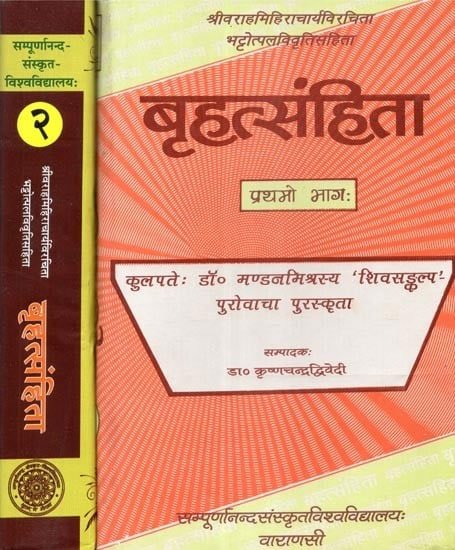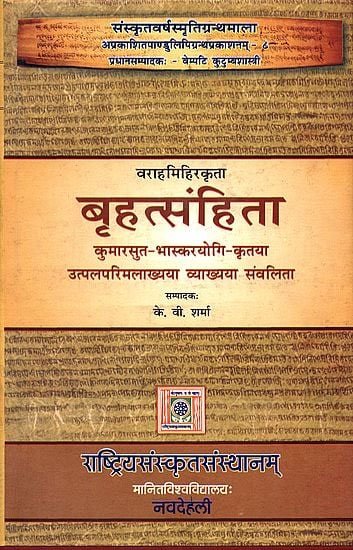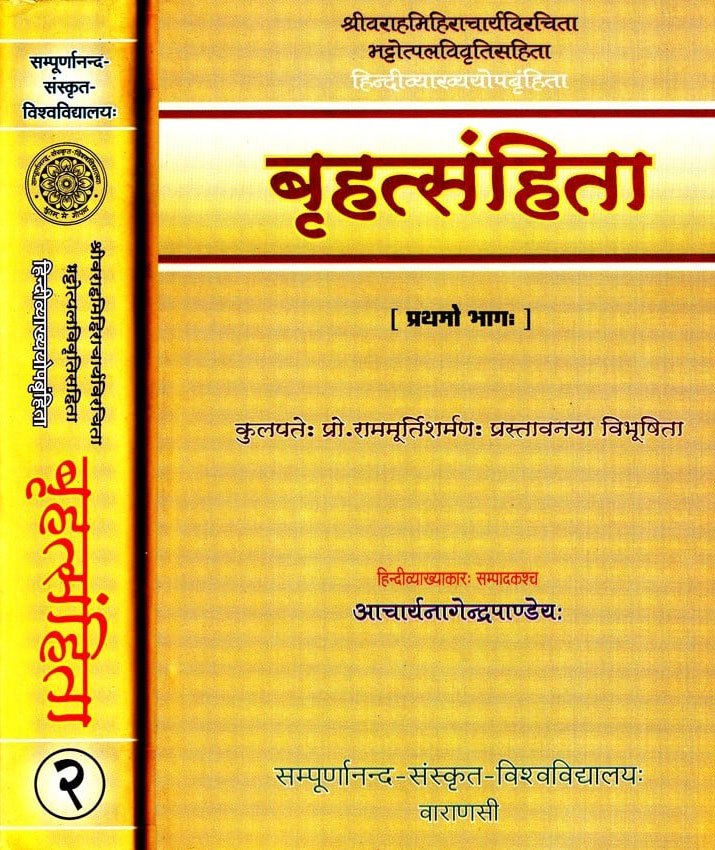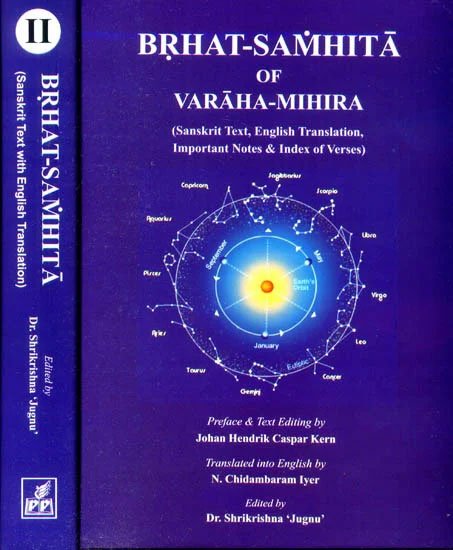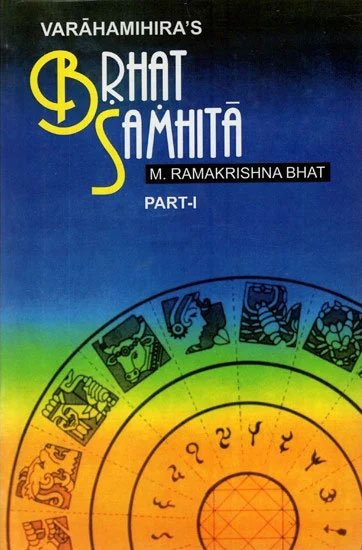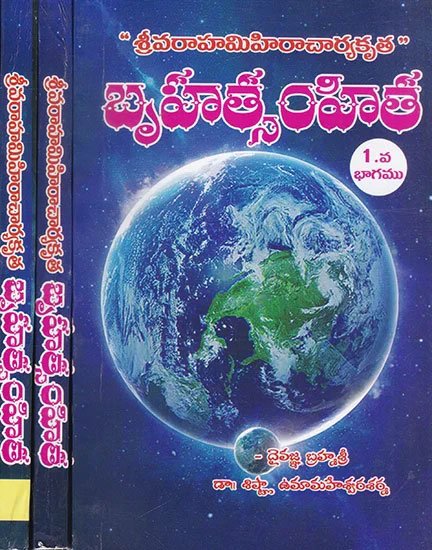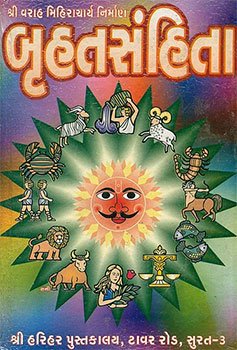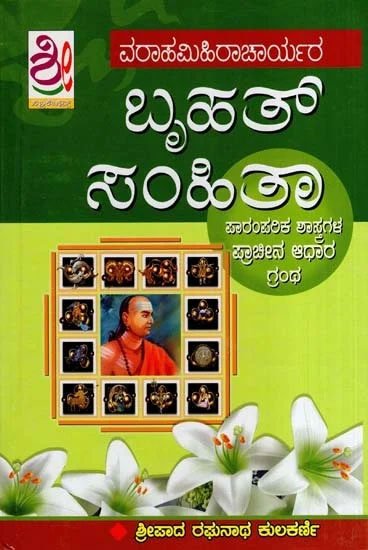Brihat-samhita [sanskrit]
26,560 words
The Sanskrit text of the Brihat-samhita from the 6th-century authored by Varaha Mihira in present-day Ujjain, India. It primarily deals with astrology and astronomy but is presented as an encyclopedia of knowledge.
Verse 103.7
रवावापद्दैन्यं रुगिति नवमे वित्त चेष्टाविरोधो जयं प्राप्नोत्युग्रं दशमगृहगे कर्मसिद्धिं क्रमेण ।
जयस्थानं मानं विभवमपि चैकादशे रोगनाशं सुवृत्तानां चेष्टा भवति सफला द्वादशे नेतरेषाम् ॥ ७ ॥
[चित्त । जयं स्थानं]
ravāvāpaddainyaṃ rugiti navame vitta ceṣṭāvirodho jayaṃ prāpnotyugraṃ daśamagṛhage karmasiddhiṃ krameṇa |
jayasthānaṃ mānaṃ vibhavamapi caikādaśe roganāśaṃ suvṛttānāṃ ceṣṭā bhavati saphalā dvādaśe netareṣām || 7 ||
[citta | jayaṃ sthānaṃ]
The Sanskrit text of Verse 103.7 is contained in the book Brihata Samhita (Sanskrit Text with Hindi Translation) by Pandit Achyutananda Jha. This book is available online or you could buy the latest edition:
Read online Buy now! The Sanskrit text by Pandit Achyutananda Jha (2001)
Glossary of Sanskrit terms
Note: This extracts Sanskrit terms and links to English definitions from the glossary, based on an experimental segmentation of verse (103.7). Some terms could be superfluous while some might not be mentioned. Click on the word to show English definitions.
Rava, Ravi, Apad, Dainya, Ruc, Iti, Navama, Vitta, Ceshta, Ira, Udhas, Jaya, Pra, Ugra, Dashama, Karmasiddhi, Kramena, Krama, Tha, Mana, Vibhava, Api, Ekadasha, Roganasha, Suvritta, Bhavati, Bhavat, Bhavant, Saphala, Dvadasha, Neta, Resh, Resha, Citta,
Analysis of Sanskrit grammar
Note: this is an experimental feature and only shows the first possible analysis of the Sanskrit text (Verse 103.7). If the system was successful in segmenting the sentence, you will see of which words it is made up of, generally consisting of Nouns, Pronouns, Verbs, Participles and Indeclinables. Click on the link to show all possible derivations of the word.
- Line 1: “ravāvāpaddainyaṃ rugiti navame vitta ceṣṭāvirodho jayaṃ prāpnotyugraṃ daśamagṛhage karmasiddhiṃ krameṇa ”
- ravāvā -
-
rava (noun, masculine)[nominative dual], [vocative dual], [accusative dual]ravi (noun, masculine)[locative single]√ru (verb class 1)[imperative active first dual]√ru (verb class 2)[imperative active first dual]
- āpad -
-
āpad (noun, feminine)[compound], [adverb], [nominative single], [vocative single]√āp (verb class 5)[aorist active third single]
- dainyam -
-
dainya (noun, neuter)[adverb], [nominative single], [accusative single]
- rug -
-
ruc (noun, feminine)[compound], [adverb], [nominative single], [vocative single]
- iti -
-
iti (indeclinable particle)[indeclinable particle]iti (noun, feminine)[compound], [adverb]
- navame -
-
navama (noun, masculine)[locative single]navama (noun, neuter)[nominative dual], [vocative dual], [accusative dual], [locative single]navamā (noun, feminine)[nominative dual], [vocative single], [vocative dual], [accusative dual]
- vitta -
-
vitta (noun, masculine)[compound], [vocative single]vitta (noun, neuter)[compound], [vocative single]√vid -> vitta (participle, masculine)[vocative single from √vid class 6 verb]√vid -> vitta (participle, neuter)[vocative single from √vid class 6 verb]√vid -> vitta (participle, masculine)[vocative single from √vid class 7 verb]√vid -> vitta (participle, neuter)[vocative single from √vid class 7 verb]√vid (verb class 2)[imperative active second plural]
- ceṣṭāvi -
-
ceṣṭa (noun, masculine)[nominative dual], [vocative dual], [accusative dual]
- iro -
-
irā (noun, feminine)[nominative single]√ir (verb class 6)[imperative active second single]
- udho* -
-
udhas (noun, neuter)[compound], [nominative single], [vocative single], [accusative single]
- jayam -
-
jaya (noun, masculine)[adverb], [accusative single]jaya (noun, neuter)[adverb], [nominative single], [accusative single]jayā (noun, feminine)[adverb]
- prā -
-
pra (noun, masculine)[compound], [vocative single]pra (noun, neuter)[compound], [vocative single]prā (noun, feminine)[nominative single]pra (Preverb)[Preverb]prā (Preverb)[Preverb]
- āpnotyu -
-
√āp (verb class 5)[present active third single]
- ugram -
-
ugra (noun, masculine)[adverb], [accusative single]ugra (noun, neuter)[adverb], [nominative single], [accusative single]ugrā (noun, feminine)[adverb]
- daśama -
-
daśama (noun, masculine)[compound], [vocative single]daśama (noun, neuter)[compound], [vocative single]
- gṛha -
-
gṛha (noun, masculine)[compound]
- ge -
-
ga (noun, masculine)[locative single]ga (noun, neuter)[nominative dual], [vocative dual], [accusative dual], [locative single]gā (noun, feminine)[nominative dual], [vocative single], [vocative dual], [accusative dual]
- karmasiddhim -
-
karmasiddhi (noun, feminine)[accusative single]
- krameṇa -
-
krameṇa (indeclinable)[indeclinable]krama (noun, masculine)[instrumental single]
- Line 2: “jayasthānaṃ mānaṃ vibhavamapi caikādaśe roganāśaṃ suvṛttānāṃ ceṣṭā bhavati saphalā dvādaśe netareṣām || 7 |”
- jayas -
-
jaya (noun, masculine)[nominative single]ji (noun, masculine)[nominative plural], [vocative plural]ji (noun, feminine)[nominative plural], [vocative plural]
- thān -
-
tha (noun, masculine)[accusative plural]
- am -
-
a (noun, masculine)[adverb], [accusative single]ap (noun, feminine)[compound]ap (noun, neuter)[compound], [adverb], [nominative single], [vocative single], [accusative single]ā (noun, feminine)[adverb]e (noun, masculine)[accusative single]
- mānam -
-
māna (noun, masculine)[adverb], [accusative single]māna (noun, neuter)[adverb], [nominative single], [accusative single]√man -> māna (participle, masculine)[accusative single from √man class 4 verb], [accusative single from √man class 8 verb]√man -> māna (participle, neuter)[nominative single from √man class 4 verb], [accusative single from √man class 4 verb], [nominative single from √man class 8 verb], [accusative single from √man class 8 verb]
- vibhavam -
-
vibhava (noun, masculine)[adverb], [accusative single]vibhava (noun, neuter)[adverb], [nominative single], [accusative single]vibhavā (noun, feminine)[adverb]
- api -
-
api (indeclinable preposition)[indeclinable preposition]ap (noun, neuter)[locative single]
- cai -
-
ca (indeclinable conjunction)[indeclinable conjunction]ca (noun, masculine)[compound], [vocative single]ca (noun, neuter)[compound], [vocative single]cā (noun, feminine)[nominative single]
- ekādaśe -
-
ekādaśa (noun, masculine)[locative single]ekādaśa (noun, neuter)[nominative dual], [vocative dual], [accusative dual], [locative single]
- roganāśam -
-
roganāśa (noun, masculine)[adverb], [accusative single]roganāśa (noun, neuter)[adverb], [nominative single], [accusative single]
- suvṛttānām -
-
suvṛtta (noun, masculine)[genitive plural]suvṛtta (noun, neuter)[genitive plural]suvṛttā (noun, feminine)[genitive plural]
- ceṣṭā* -
-
ceṣṭa (noun, masculine)[nominative plural], [vocative plural]ceṣṭā (noun, feminine)[nominative plural], [vocative plural], [accusative plural]
- bhavati -
-
bhavatī (noun, feminine)[adverb], [vocative single]bhavat (noun, masculine)[locative single]bhavat (noun, neuter)[locative single]bhavant (pronoun, masculine)[locative single]bhavant (pronoun, neuter)[locative single]√bhū (verb class 1)[present active third single]
- saphalā* -
-
saphala (noun, masculine)[nominative plural], [vocative plural]saphalā (noun, feminine)[nominative plural], [vocative plural], [accusative plural]
- dvādaśe -
-
dvādaśa (noun, masculine)[locative single]dvādaśa (noun, neuter)[nominative dual], [vocative dual], [accusative dual], [locative single]
- neta -
-
neta (noun, masculine)[compound], [vocative single]neta (noun, neuter)[compound], [vocative single]
- reṣām -
-
reṣ (noun, masculine)[genitive plural]reṣ (noun, neuter)[genitive plural]reṣā (noun, feminine)[accusative single]
- Cannot analyse 7
- Line 3: “[citta ”
- citta -
-
citta (noun, masculine)[compound], [vocative single]citta (noun, neuter)[compound], [vocative single]√cit (verb class 2)[imperative active second plural]
Other editions:
Also see the following editions of the Sanskrit text or (alternative) English translations of the Verse 103.7
Brhatsamhita with the Commentary of Bhattotpala
by Krishna Chandra Dwivedi (2016)
Publisher: Sampurnanand Sanskrit University; 1229 pages;
Buy now!
Brihat Samhita with the Commentary of Utpalapatimala of Yogisvara
by K. V. Sharma (2012)
Publisher: Rashtriya Sanskrit Sansthan, Janakpuri; 754 pages; ISBN-10; 8186111360; ISBN-13: 9788186111369
Buy now!
Brihat Samhita (Hindi Translation)
by K. V. Sharma (2002)
Publisher: Sampurnanand Sanskrit University; 2359 pages; ISBN-13: 9789387890008.
Buy now!
Brhat Samhita (English translation)
by N. Chidambaram Iyer (2022)
Publisher: Parimal Publication Pvt. Ltd.; 801 pages; Edited by Dr. Shrikrishna Jugnu; ISBN-10: 8171104215; ISBN-13: 9788171104215.
Buy now!
Brhat Samhita (English with notes)
by M. Ramakrishna Bhat (2010)
Publisher: Motilal Banarsidas Publishers Pvt. Ltd.; 1155 pages; ISBN-10: 8120810600; ISBN-13: 9788120810600.
Buy now!
Brhat Samhita (Telugu translation)
by Sishtla Umamaheswara Sharma (2020)
Publisher: Mohan Publications, Andhra Pradesh; 846 pages.
Buy now!Preview of verse 103.7 in Kannada sript:
ರವಾವಾಪದ್ದೈನ್ಯಂ ರುಗಿತಿ ನವಮೇ ವಿತ್ತ ಚೇಷ್ಟಾವಿರೋಧೋ ಜಯಂ ಪ್ರಾಪ್ನೋತ್ಯುಗ್ರಂ ದಶಮಗೃಹಗೇ ಕರ್ಮಸಿದ್ಧಿಂ ಕ್ರಮೇಣ ।
ಜಯಸ್ಥಾನಂ ಮಾನಂ ವಿಭವಮಪಿ ಚೈಕಾದಶೇ ರೋಗನಾಶಂ ಸುವೃತ್ತಾನಾಂ ಚೇಷ್ಟಾ ಭವತಿ ಸಫಲಾ ದ್ವಾದಶೇ ನೇತರೇಷಾಮ್ ॥ ೭ ॥
[ಚಿತ್ತ । ಜಯಂ ಸ್ಥಾನಂ]
Brhat Samhita (Gujarati translation)
by - (2000)
Publisher: Shree Harihar Pustakalay, Surat; Author: Shri Varahamihira Acharya (શ્રી વરાહમિહીરાચાર્ય); 432 pages.
Buy now!Preview of verse 103.7 in Gujarati sript:
રવાવાપદ્દૈન્યં રુગિતિ નવમે વિત્ત ચેષ્ટાવિરોધો જયં પ્રાપ્નોત્યુગ્રં દશમગૃહગે કર્મસિદ્ધિં ક્રમેણ ।
જયસ્થાનં માનં વિભવમપિ ચૈકાદશે રોગનાશં સુવૃત્તાનાં ચેષ્ટા ભવતિ સફલા દ્વાદશે નેતરેષામ્ ॥ ૭ ॥
[ચિત્ત । જયં સ્થાનં]
Brhat Samhita (Kannada translation)
by Sripada Raghunatha Kulkarni (2021)
Publisher: Srinidhi Publications, Bangalore; 668 pages with illustrations.
Buy now!Preview of verse 103.7 in Kannada sript:
ರವಾವಾಪದ್ದೈನ್ಯಂ ರುಗಿತಿ ನವಮೇ ವಿತ್ತ ಚೇಷ್ಟಾವಿರೋಧೋ ಜಯಂ ಪ್ರಾಪ್ನೋತ್ಯುಗ್ರಂ ದಶಮಗೃಹಗೇ ಕರ್ಮಸಿದ್ಧಿಂ ಕ್ರಮೇಣ ।
ಜಯಸ್ಥಾನಂ ಮಾನಂ ವಿಭವಮಪಿ ಚೈಕಾದಶೇ ರೋಗನಾಶಂ ಸುವೃತ್ತಾನಾಂ ಚೇಷ್ಟಾ ಭವತಿ ಸಫಲಾ ದ್ವಾದಶೇ ನೇತರೇಷಾಮ್ ॥ ೭ ॥
[ಚಿತ್ತ । ಜಯಂ ಸ್ಥಾನಂ]
![Brihat-samhita [sanskrit] - book cover](/uploads/a/Brihat-Samhita-Sanskrit.jpg)
